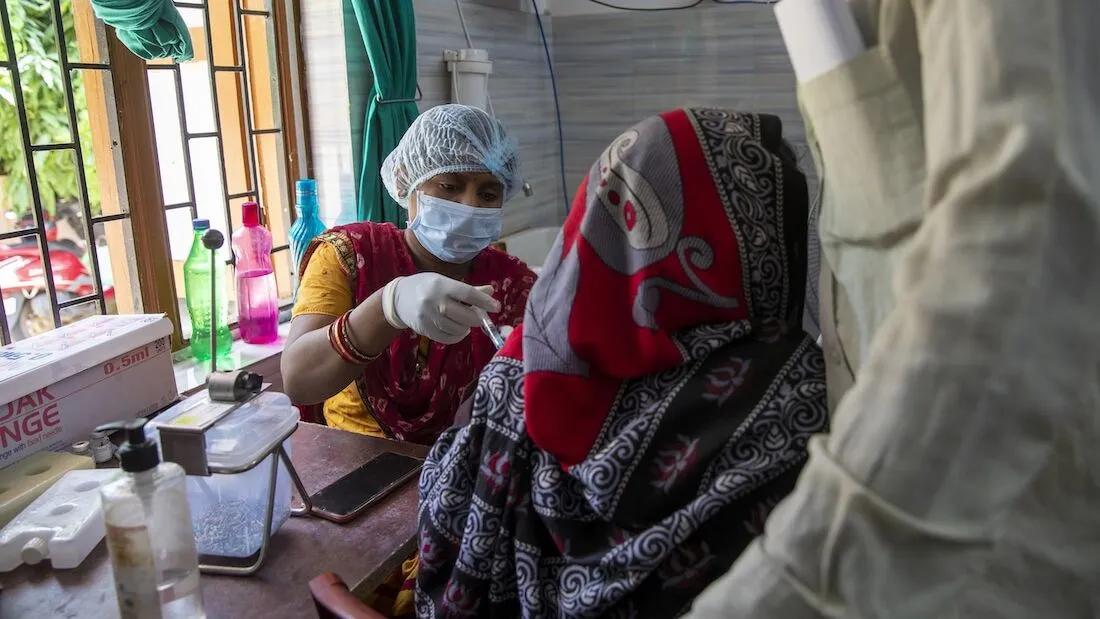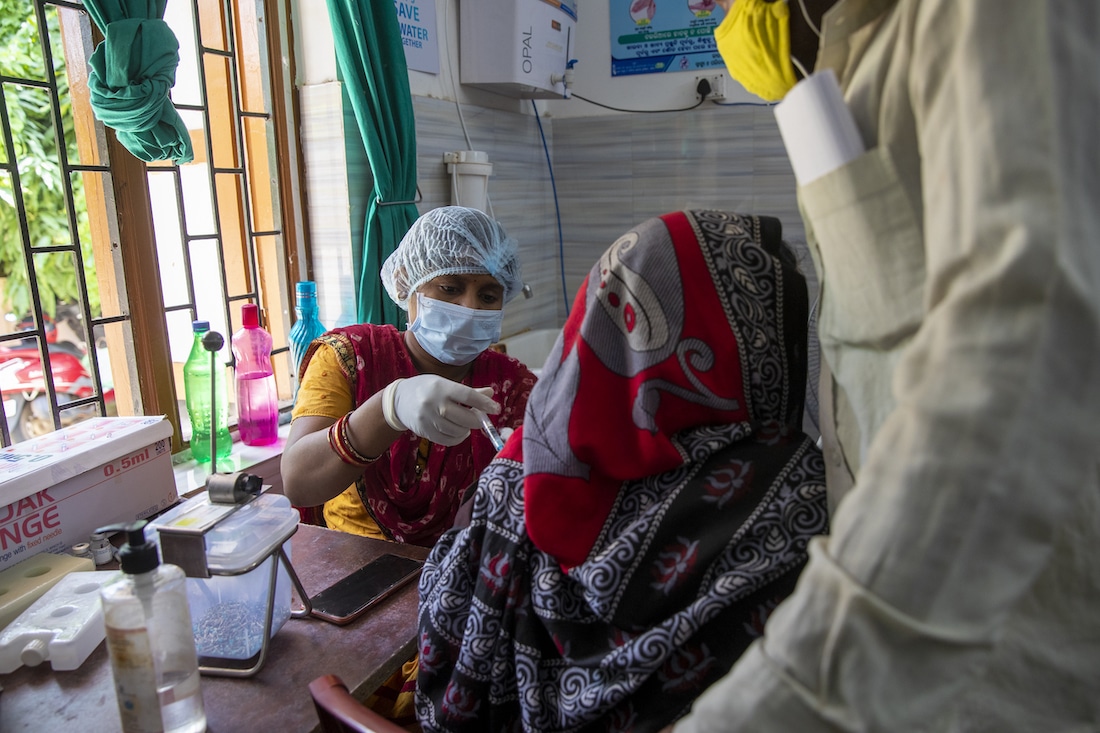How Do You Train Over 100,000 Health Workers During A Pandemic?
Project HOPE’s COVID-19 trainings have helped more than 100,000 health care workers around the world treat the disease, reduce vaccine hesitancy, and protect their own mental health.

When COVID-19 first hit Nepal, Mamta was completing her master’s degree in nursing in Kathmandu, where she was posted in Dhading district hospital.
Within just a few weeks, more and more patients started presenting with the serious and sometimes fatal side effects of a mysterious coronavirus no one had seen before.
“Patients and health workers were panicked and anxious,” Mamta says. “Physicians and nurses who had no experience with infectious disease were recruited to provide care to patients with COVID-19. That made the whole scenario very much a disaster.”
Health care workers at Dhading were fighting to keep up, just like nearly every other hospital and clinic around the world. Challenged by a totally new context, exhausted by long hours, wearing heavy protective gear, and weighed down by the fear of becoming infected and infecting others, Mamta says they felt powerless at the hands of the virus. Without the knowledge they needed, they could only do so much for their patients under such exceptionally stressful circumstances.
There were desperate shortages in equipment and supplies, but there was an even larger gap with more dangerous consequences: the gap in knowledge.

Training to fill the gaps
Even before COVID-19 was declared a global pandemic, Project HOPE was developing a COVID-19 preparedness and response curriculum to support the rapid scale-up of response efforts in high-risk countries. Developed in partnership with experts at Brown University, the curriculum helps health care workers learn how to safely screen, triage, and treat patients with the virus.
To overcome mobility challenges and expand access to the training, Project HOPE partnered with DisasterReady to convert the content into a free eLearning curriculum — one of the first online COVID-19 trainings for health care workers and others on the front lines of the pandemic.
In the early months of the pandemic, as health care workers and experts scrambled to understand COVID-19, Project HOPE’s trainings provided critical knowledge to help frontline personnel treat patients and prevent the spread of the disease. Since then, those trainings have evolved to include guidance for COVID-19 vaccinations and resources for health care workers to protect their mental health.
To date, Project HOPE’s COVID-19 trainings have reached more than 113,000 health care workers and frontline personnel around the world.
“Equipping health care workers with knowledge has always been important, but in a global pandemic it’s probably the most important thing we can do,” says Vlatko Uzevski, Project HOPE’s Deputy Director of Emergency Response and Preparedness. “That’s why Project HOPE and its partners put a huge emphasis on the development and delivery of trainings that are beneficial for those on the front lines of the fight and facing the pandemic in the developing world.”

Boosting vaccine education and acceptance
As the first COVID-19 vaccines became available, Project HOPE implemented in-person vaccine literacy trainings to train health care workers to quickly and safely immunize as many people as possible. Thanks to a partnership with the Cornerstone OnDemand Foundation and SweetRush, we’ve been able to offer the training on DisasterReady.org so the courses are accessible to health care workers in remote regions and low- and middle-income countries as well.
Participants learn about proper vaccine storage, preparation, and administration. They are also trained on how to respond to questions and concerns raised by local populations. All trainings have been developed in accordance with World Health Organization standards and are frequently updated as best practices and evidence evolves.
“I must admit that I was very wary of the vaccine … [but] after the online training, I immediately understood that it is imperative to be vaccinated.”
– Dr. Jean Landry Ramisimamonjy
As a counselor of a Special Nurse Group formed to support a government fight against COVID-19, Mamta has been approached with many vaccine-related questions.
“There were so many queries from people, like whether vaccines can be given to breastfeeding mothers, its contraindications, gaps between doses, and so on,” she says. “The Project HOPE training has given me a lot of confidence in dealing with every question.”
These trainings are helping overcome the hurdle of vaccine hesitancy and ensuring vaccinators are prepared and ready to meet the demands of their local communities. Just like the acute care trainings, health care workers are encouraged to cascade the training to reach others within their networks.
Dr. Jean Landry Ramisimamonjy, a physician in Madagascar, is one of many who initially distrusted the vaccine.
“I must admit that I was very wary of the vaccine,” she says. “That was what motivated me to attend this training — to overcome this skepticism.
“After the online training, I immediately understood that it is imperative to be vaccinated. Ultimately, I was not only among the first to get vaccinated, but I could also convince my family and loved ones to get vaccinated, too.”
Two days after the training, Ramisimamonjy gathered together with colleagues and health care workers from the hospital, health center, and district health service to share what she learned. She also held a two-hour training session with staff of each regional department and shared the link to training materials with the five health districts that make up the region.

A hidden crisis
To address the pandemic’s toll on mental health, Project HOPE is also implementing mental health and resiliency trainings for health care workers. Originally piloted in the Dominican Republic and Indonesia with support from the Abbott Fund, the training modules are adapted from New York City Health + Hospitals program, HERO-NY, which provides stress management and coping tools for frontline health care workers. The training has since expanded to cross five continents and reach some of the world’s most vulnerable countries and communities, thanks to generous support from the Center for Disaster Philanthropy.
Held both in-person and online, the trainings give health care workers the chance to discuss topics like stress, grief, and trauma.
“Health care workers responding to COVID-19 have been experiencing extended high levels of stress like never before,” says Rawan Hamadeh, Project HOPE’s associate project coordinator for mental health programming.
In a profession where patients are put first, it is our duty to reach health care workers and provide them with available knowledge and tools to maintain their physical and mental well-being.
– Rawan Hamadeh
“In a profession where patients are put first, it is our duty to reach health care workers and provide them with available knowledge and tools to maintain their physical and mental well-being. The mental health and resilience training provides a safe space for doctors, nurses, and other frontline workers to share their struggles and to feel that they are not alone in this, away from any stigmatization or judgment.”
Since our founding, Project HOPE has trained more than 1 million health care workers with the knowledge and skills they need to save lives around the world. When COVID-19 first emerged in Wuhan, China, some of the first responders were graduates of the Wuhan HOPE School of Nursing. Our COVID-19 trainings have since reached students, midwives, nurses, doctors, and other frontline personnel in over 150 countries and territories — from the hard-hit Navajo Nation to the farthest reaches of rural Africa.
Across the map, these health care workers are trained to share the knowledge they learn with other health care workers in their communities, effectively cascading the training to reach thousands more health personnel on the front lines of the greatest health challenge of our generation.
Thanks to that knowledge, says Merima Ljuskov, a doctor from Montenegro, health care workers are more prepared to meet the challenge, even as variants of the virus continue to spread.
“I am so thankful to Project HOPE,” she says. “The training was very practical and instructive, and very important for me and my other colleagues who participated in the training I was able to lead. It is all essential information, very concisely presented in one place.”



